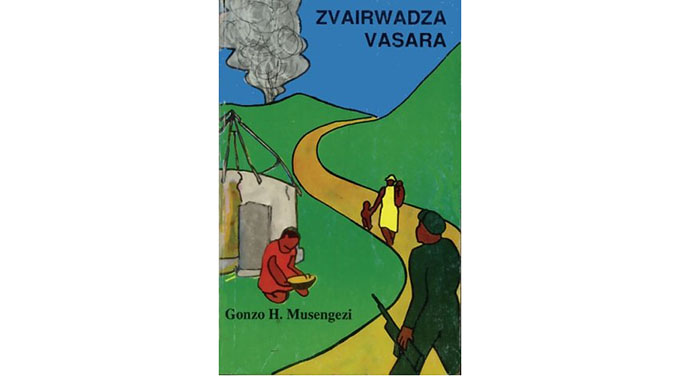Be wary of The Unwelcome Visitor, My Son
Elliot Ziwira At The Bookstore
The temptation is always to ignore such books and dismiss or give them to kids. Well, are books written for children by adults supposed to be read only by children?When we were young we were always thrilled by our grandmother VaVhariyeta’s (Violet) stories, especially those that involved hunting.The perilous nature of hunting was never lost on our tender hearts, but the thrill of being part of the jubilant hunters as they skilfully took aim at their quarry, was as ennobling as it was unnerving, and as lasting as it was short-lived.
There was always the danger of the hunter ending up being the prey, not so much because of cowardice, but the nature of hunting itself never guaranteed totality of success.
The stories would sometimes shift to animal characters, and humanity would be in for a scary treat. Human-wildlife conflict usually left me perplexed and sulky. Now that the jungle has since assumed many monikers, my grandmother’s folktales have taken on a new trajectory. All around us are jungles; we are all prey thrown into the jungles of our existence, and in the struggle to survive we resort to the predatory instincts inherent in us. We take aim, even at seemingly harmless birds.
We sometimes look around for weapons, and many a time we only find ourselves as the only armoury and shields against our foes, real or imagined.
When hunting becomes a pastime for the rich, who kill for fun because they can afford to, then the lot of us must be pacified through the knowledge that some animals are sacred, and that hunting is outlawed.
Wondering whether one day I would find myself at a crossroads, facing the prospect of death or jail as a pangolin, lion, leopard or python crosses my path, I bumped into two books. Both books were nominated for the 2017 NAMA awards in the Outstanding Children’s Book category, with one of them eventually grabbing the gong.
Farayi Nyandoro’s “The Unwelcome Visitors” (2016) published by The Jomo Kenyatta Foundation ,which won the 2017 NAMA award, and Albert Nyathi and Ignatius Mabasa’s “My Son” (2016) published by Imbongi Arts Publications are indeed more than mere children’s books.
Rarely do children’s books make an impact at the Bookstore as does Albert Nyathi and Ignatius Mabasa’s “My Son” with its seemingly simple exhortation form, large font, conversational language and illustrations. The temptation is always to ignore such books and dismiss or give them to kids. Well, are books written for children by adults supposed to be read only by children? Who should decide what our children should read if as adults we do not take time to read the books meant for them?
Thinking of Mabasa’s hilarious satirical novels “Mapenzi” and “Ndafa Here” as well as the rib-cracking short story “Some Kind of Madness”, I was eager to find out what the dub poet Albert Nyathi and the satirist were up to.
The opening lines took me in: “My son Shakespeare/Do not shake your spear everywhere./There are angry leopards and buffaloes/and antelopes/wounded from previous encounters with hunters./They are restless and careless and may,/in the heat of the moment, hurt/themselves or new hunters./Let that not be you,/my son Shakespeare.”
I immediately thought of my teenage son Munashe thrown into the jungle with so many enticing species and wounded predators, and it dawned on me that hunting will remain a metaphor that shapes our existence.
Hidden in the bold words in the book are serious metaphors of betrayal, deceit, individualism, greedy, chicanery and resilience. The images adeptly drawn from nature give the book transcendental appeal. Each animal used and illustrated has its own unique way of pulling the unguarded and unschooled young man into the mire.
The world has become a jungle, and all the animals in my grandmother’s folktales are given an awakening that vividly dovetails with the metaphorical allure in the images and symbols used in the book. The spear, another metaphor in the book, becomes the only tool with which to resolve conflict, albeit cautiously.
From the skunk’s suffocating perfume, the leopard’s deceitful skin, the chameleon’s misleading attire, the deceptive allure of the springbok, to the emotionless tears of the crocodile, the father advises his son to take heed. The young man has to be aware of the nature of the modern jungle where social media has given the word deception a new meaning.
In such a world where there are more questions than answers, one always has to be on the lookout for the sacred pangolin, the intimidating lion and the slithering temptation of the python, for aiming a spear at such prey is always catastrophic. The political, social and economic allegory will indeed be lost on young readers, but the message remains strong, especially when read in reference to the orgy that has become of city life and its attendant metaphors of the bar, city woman and social media.
In relationships, the father implores his son to be wary of the trampling elephant and the laughing hyena, which are capable of hardening it until all emotions and feelings are fed to the vultures, and in the end he is unable to control his ire; subsequently causing untold suffering to the vulnerable; old and young.
Fear, sometimes, the father implores, is the best weapon against adversary, as aiming one’s spear everywhere is calamitous, for “everywhere is nowhere” and “everybody is nobody”.
There is need to be cautious, and avoid enticing battles that are never won, and the sugar mummies, or city women oozing sugary diseases and death, thus switching roles from the hunter to the hunted.
However, although the admonishing voice clearly articulates how to hunt and how not to hunt, it falls short on what to do if the hunter inevitably finds himself face to face with the predators which he has always been advised to avoid.
Because he is told the value of fear, the young man will not find the courage to fight back even though he is aware that the jungle will, at one point, throw its might against him.
Farayi Nyandoro’s “The Unwelcome Visitors”, goes further in exploring the reality of the hunter-hunted metaphor, looking closely at the human-wildlife conflict in the modern jungle.
His is a story of a community that is at the mercy of lions which kill their cattle at will, putting not only their animals’ lives in danger, but theirs as well.
It is the story of a 14-year-old boy — Kazungu Kantai — whose family, like others in their Amani community, loses six head of cattle to a pride of lions. The community puts so much value into livestock, thus losing even one is disheartening.
His father Barua, and friend Mr Alfred Wetende are among the Amani Six, who take the law into their own hands in the fight against the lions that decimate their livestock. They eventually kill four of the lions, but as the law seems to protect wild animals the six men are arrested which baffles Mr Wetende who quips: “But why do these laws protect such wild animals? Were the leaders who enacted them blind to the plight of villagers due to these predators? If they overlooked people like us and our livestock, let them go back to the drawing board and amend these laws as they are not cast in stone.”
They are told that “the lions also need to be preserved for the sake of posterity”, as well as the fact that “millions of people depend on tourism for their livelihoods. Companies that own vehicles used in ferrying the visitors during game drives also gain.”
As African laws seem to be skewed in favour of tourists against the continent’s people and their overall livelihoods, Kazungu comes to the rescue of his people. As an ardent follower of science he devises a flashing light which scares away lions, much to the benefit of his community as the flash lights are used throughout Amani and beyond.
As an innovative young scientist he puts his country’s name on the world map, and makes his parents proud.
Following a thin or rather predictable plot, Nyandoro’s story captures the young minds, who aspire to bring solutions to their communities, not through kowtowing to fear, intimidation or otherwise.
There is always the need to be wary of unwelcome visitors, but believing that they would never pay a visit is as dangerous as avoiding them. Fear, though inevitable, is not the solution to challenges but finding a way around the source of the fear is the panacea.







Comments